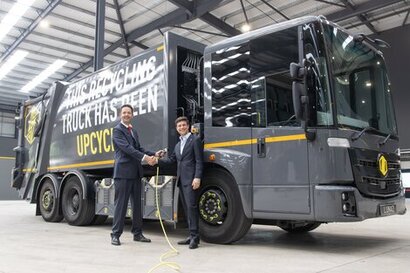
This follows the signing of a Fleet Electrification Agreement at a COP Event hosted at the company’s Silverstone HQ. This started a programme of detailed technical and economic assessment, which enabled them to assemble a highly credible proposal for the competitive tendering process leading to confirmation of the first order.
The first Buckinghamshire bin lorry to become fully electric will begin its up-cycling and electrification process as part of the pioneering partnership between Buckinghamshire Council and Silverstone-based, clean-tech company Lunaz.
The 26-tonne refuse vehicle will be converted from its existing diesel power to electric, with delivery to be made in the autumn. The work is being funded with a grant from DEFRA (Department for Environment, Food & Rural Affairs).
All Lunaz vehicles are completely stripped down and all components inspected, up-cycled and replaced as required. This includes the removal of the current diesel engine and replacing it with a fully electric drivetrain. The cab, driver functions and bin-lift equipment will also be fully refurbished and upgraded to latest technological and safety standards.
This week, Gareth Williams, Buckinghamshire Council’s Cabinet Member for Climate Change and Environment oversaw the delivery of the first diesel refuse vehicle to the team at Lunaz’ HQ on the Silverstone Technology Park.
“This is a very exciting moment for Buckinghamshire Council and a big milestone in our journey to cutting our carbon emissions and meeting our climate change strategy ambitions” said Mr Williams. “It marks the first step in our desire to run a more sustainable fleet of vehicles by using a renewable energy source and has multiple additional benefits including improving air quality and saving money both in terms of cheaper everyday running costs, and the retention of more than 80 percent of the embedded carbon versus scrapping an existing vehicle and replacing with new. In this regard, our partnership with Lunaz represents the best possible outcome for both the planet and the taxpayer. It also reflects our commitment as a council, to supporting local business and employment in the area.”
This announcement follows the signing in April 2023 of a seven-year fleet electrification programme between Biffa, the UK’s leading sustainable waste management company and Lunaz confirming a commitment to allocating a significant proportion of its 1,110 vehicle per year production capacity.
For UK councils, the procurement of these vehicles represents a dramatic saving for the taxpayer, with more than £1 million in public money saved for every 20 vehicles upcycled and electrified versus buying new EV equivalents.
The British economy further benefits as Lunaz is pioneering growth in circular practices at a critical time by supporting more than 300 jobs and a new, green capability.
Every up-cycled electric vehicle produced by Lunaz saves 82 percent of the embedded carbon within that vehicle. For context, at full capacity, Lunaz’ factory in Silverstone, UK, will save the equivalent weight of the Eiffel Tower every year in embedded carbon by upcycling rather than scrapping existing fleet vehicles.
Furthermore, Lunaz stands alone in subtracting a polluting vehicle from the global car park with every vehicle it electrifies. This is through its ‘1 for 1’ policy that ensures the decommissioning of every fossil fuel engine before recycling its components. This practice ensures existing polluting engines are completely eradicated and replaced with clean-air equivalents.
The Waste Management industry is at the frontline of a critical requirement to reduce carbon emissions from road logistics. According to a report by the World Economic Forum, ‘for the industry to limit temperature increases to no more than 1.5 degrees centigrade, two-thirds of trucks sold this decade must be zero-emissions.’
However, this must not come at the cost of scrapping millions of perfectly serviceable vehicles, in doing so increasing the carbon burden in waste and the manufacturing process. The Lunaz approach, in line with the principles of the circular economy, answers this and also creates major economic benefits.
A Lunaz UEV represents a significant Total Cost of Ownership (TCO) saving versus either existing diesel equivalents or new EVs. This accelerates the adoption of clean air vehicles by creating a more economically viable route to fleet transition.
Each UEV by Lunaz has been designed based on primary research in the field, dramatically improving the carbon impact of these vehicles and contributing to quieter and cleaner communities in which they operate.
The upcycling process also creates significant functional and operational advantages. This includes the ability to tailor the size of the powertrain to a specific route profile, enabled by the Lunaz modular proprietary powertrain. This means for shorter, more urban routes, Co is not burdened with the extra cost and weight of an overspecified battery-pack.
Critical enhancements to the cabin augment significant safety improvements. This includes the use of 360 cameras with person and cyclist detection and the re-location of the handbrake to ensure drivers never need to take their hands off the wheel.
The camera monitoring system also dramatically improves driver awareness. Two assemblies containing three cameras are mounted on the top corners of the UEV, feeding digitised rear-view mirrors.
The screens also feature object detection, highlighting cyclists, pedestrians and potential hazards to the driver. Unlike standard mirrors, these operate under all conditions, including rain, snow and total darkness, dramatically increasing safety.
Lunaz UEV refuse trucks have been developed following live operator feedback with Lunaz engineers frequently taking part in refuse truck rounds to ensure an intimate understanding of front-line requirements. Critical enhancement to driver comfort and operation have been included, ensuring crews feel the benefit of the latest technology and innovations.
Every UEV by Lunaz undergoes an exhaustive process of remanufacturing, re-engineering and electrification. This takes place at the company’s state-of-the art upcycling and electrification campus on the Silverstone Technology Park. This will support more than 300 highly skilled jobs by 2025.
For additional information:

